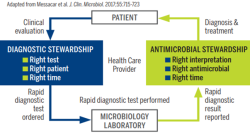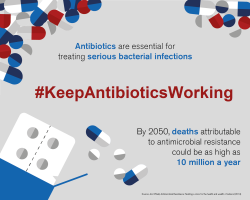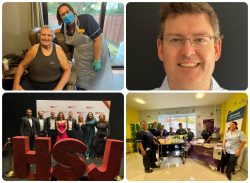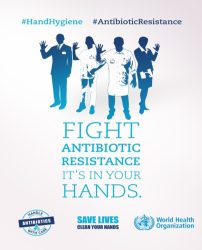Monthly archives: November 2022
Heartbeat: Learning from our experiences to improve end of life care
Over the past year the palliative care team have been leading a Trustwide quality improvement project to enhance the care delivered to patients approaching the end of life. This is relevant to colleagues in all specialties and an opportunity to see excellence in care become the consistent norm for our patients, whoever they are and wherever they are looked after.
In this issue of Heartbeat, we feature the story of Dr Paul Turner, a local GP who tells us of his experiences with our teams when his father was in his last days of his life.
Paul said: “Dad was 87 and had been working as a doctor in Africa until a year before he died. His death was a real shock to all of us as he was doing press ups every day until two months before he was admitted to hospital. He was full of life and had just re-married, so he had a lot to live for.
“We first started to notice something was wrong when he suddenly started to fall over and also had trouble breathing. One night dad couldn’t breathe well and fell which led him being admitted to Sandwell Hospital.”
Paul said doctors found that his father (William) had metastatic spread from an undiagnosed cancerous tumour. This was complicated by large pleural effusions, for which chest drains were inserted and William was admitted onto a ward.
“At the time of dad’s admission, the team looking after him kept telling him that once the chest drains are done he could go home,” added Paul. “No one actually explained how serious the situation was and that there was little that could be done to change it. Instead, they kept giving him hope for a recovery and trying different treatments that were not making a difference. Dad, being a doctor, was also desperate to get well and wanted to try everything in order to get better.
“It was during the COVID restrictions and communication was difficult as we were not able to visit dad. In the meantime, numerous teams were visiting and assessing dad and going away without really telling him what was going on.
“It soon became clear that the team looking after him really did not know what to do – dad was dying and no one was acknowledging it.
“Things changed for the better when senior doctors realised dad was dying and made the decision to put him on the supportive care plan.
“Once dad was on the correct plan we were allowed to visit him and we could see a huge change in the way the team was treating him. They showed compassion and kindness to our entire family and did everything they could to ensure dad was able to be comfortable in his last days.
“From our point of view as a family whilst learning that dad was dying was extremely shocking, it helped take away the fear and angst that we had. As a doctor, when you avoid the conversation about death you take away the opportunity for people to say goodbye and prepare for what’s to come. As healthcare teams we must be brave enough to have these conversations with patients and their families as it’s part of our role.”
“While dad’s care was not always appropriate when he was first admitted to Sandwell, we were lucky that things changed for the better and we were allowed to say goodbye to him.”
Paul Turner concluded: “We miss dad dearly. He was an extraordinary man and had a chuckle that would send his grandchildren into streams of laughter. He loved people and was one of a kind. He was very special to me.”
World Antimicrobial Awareness Week

World Antimicrobial Awareness Week (WAAW) aims to raise awareness of antimicrobial resistance (AMR) – one of the leading risks to human health.
Today’s theme is optimising diagnostics
The UK National Action Plan for Tackling Antimicrobial Resistance seeks to embed evidence-based clinical decision support tools and diagnostics tests into antimicrobial prescribing. Some key examples include:
Decision support tools:
- FeverPAIN and Centor when assessing sore throat
- CURB-65 when assessing CAP
- Local HAP severity scoring
- PHE diagnostic flowcharts for UTI
Laboratory testing
- Microbiology samples for routine culture and sensitivity
- Essential to gold standard treatment
- Underpin rationalisation of antimicrobials
- COVID-19/influenza testing
- Procalcitonin (PCT)
- Rapidly induced Inflammatory biomarker specific to bacterial infection
- Legionella/pneumococcal urinary antigen tests
Near patient testing
- Urinalysis dipsticks
- Very useful when used correctly alongside clinical signs and symptoms
- Not useful in patients with asymptomatic bacteriuria such as patients:
- With urinary catheters
- Over 65 years old
Clinicians must ensure they are aware of the diagnostic tools available and use them appropriately.
MIDAS Awards: Congrats Ed!

On Friday 18 November, Dr Ed Fogden received an award from the Midlands Inclusivity and Diversity Award Scheme (MIDAS) for absolutely epitomising the role of an ally.
As a consultant gastroenterologist working in a busy acute hospital serving one of the most diverse populations in the UK, Ed has spent his career alongside colleagues from many ethnicities representing the communities they care for.
Recognising his privileged background has caused Ed to search deeply to ensure he never misses an opportunity to support others across both clinical and non medical disciplines. He is passionate about equality and diversity and is a proud ally in both.
Over the last year he has been a prominent member of the Trust’s Womens Clinician Network focussed on promoting equality, creating and maintaining safe spaces and nurturing a culture of challenge.
Founder of the network and a deputy medical director of the Trust Dr Sarb Clare commented: “Ed absolutely epitomises the role of an ally. He continually reflects on his experience and I am aware he has proactively researched topics around sexism, racism, unconscious bias and micro aggressions. Ed truly demonstrates true deep growth as well as altruism. We are very lucky to have him as a colleague and ally in our Trust.”
Boost your immunity this winter by getting your COVID and flu vaccinations

Boost your immunity this winter by getting your COVID and flu vaccinations.
The occupational health and wellbeing team continue to offer vaccinations to colleagues across the Trust.
We’re now at the time of year when respiratory infection figures start to increase, with the possibility for a surge of COVID and seasonal flu. As in the previous year, all colleagues at our Trust will be able to protect themselves with a COVID-19 booster jab and a flu vaccination, ensuring they are fully protected.
You must have had two primary doses of either Pfizer, AstraZeneca or Moderna. Your last vaccine must have been more than 91 days ago and you must be 18 years or over to meet the criteria. Flu vaccine being offered to SWB colleagues is cell-based quadrivalent influenza (QIVc).
Points to remember:
- You can have the flu and show no symptoms meaning you can be unknowingly spreading the virus to your family, friends and our patients.
- It’s important to have vaccinations as soon as possible, it can take up to two weeks for your body to build up good level of immunity.
- Our flu vaccines do not contain any porcine or egg ingredients.
You will be able to have either or both of the vaccines, administered in two separate injections, on the same day.
If possible, please have your NHS number to hand upon attending, as this will help speed up the process.
Clinics are based at the following locations:
- Sandwell: The Berridge room, Courtyard Gardens
- City: first floor former outpatients area (above the Arches canteen)
- Rowley: Westwood Ward
For any departments that are struggling to leave their areas due to workload, the team are able to work with you to arrange a vaccinator to attend the department. To discuss this, managers should contact Cara Shelton on 07507 523924.
Note: Tipton Sports Academy vaccine centre will close to the public on Monday 19 December. The opening hours at the centre will also be reduced to 9am – 5pm from Monday 21 November.
A schedule from November until the new year is available below.
| 21 November Sandwell, 08:30-16:00 | 22 November Sandwell, 08:30-16:00 | 23 November Sandwell, 08:30-16:00
Lyng Centre, 13:00-15:00 |
24 November Sandwell, 08:30-20:00 | 25 November Sandwell, 08:30-16:00 | 26 November No clinics | 27 November No clinics |
| 28 November City, 08:30-16:00 | 29 November City, 08:30-16:00 | 30 November City, 08:30-16:00 | 1 December City, 08:30-20:00 | 2 December City, 08:30-16:00 | 3 December No clinics | 4 December No clinics |
| 5 December
Sandwell, 08:30-16:00 |
6 December Sandwell, 08:30-16:00 | 7 December Sandwell, 08:30-16:00 | 8 December Sandwell, 08:30-16:00 | 9 December Sandwell, 08:30-16:00 | 10 December No clinics | 11 December No clinics |
| 12 December
City, 08:30-16:00 |
13 December City, 08:30-16:00 | 14 December City, 08:30-16:00 | 15 December City, 08:30-16:00 | 16 December City, 08:30-16:00 | 17 December City, 08:30-16:00 | 18 December No clinics |
| 19 December Sandwell, 08:30-16:00 | 20 December Sandwell, 08:30-16:00 | 21 December Sandwell, 08:30-16:00 | 22 December Sandwell, 08:30-16:00 | 23 December Sandwell, 08:30-16:00 | 24 December No clinics | 25 December No clinics |
| 26 December No clinics | 27 December No clinics | 28 December City, 08:30-16:00 | 29 December City, 08:30-16:00 | 30 December City, 08:30-16:00 | 31 December No clinics |
World Antimicrobial Awareness Week

World Antimicrobial Awareness Week (WAAW) aims to raise awareness of antimicrobial resistance (AMR) – one of the leading risks to human health.
Today’s theme is antimicrobials in clinical practice
Antimicrobials are fundamental to medical practice – but they are not a panacea to be used blindly. Our patients need the right agent, at the right dose, for the right duration by the right route.
Key national messages this WAAW:
- Refer to our Trust guidelines when selecting an antimicrobial.
- Clearly document a course length or a review date.
- Review regularly and consider switching IV to oral in line with new national guidelines
- A recent audit at UHB showed IV agents take more than sixteen times longer to administer than oral (22 minutes vs 80 seconds).
Would you like to know more?
Join us for clinical grand round on 24 November, 12.30pm -1.30pm to learn more about how extensive antimicrobial resistance already threatens our patients at SWB.
Consider watching this Health Education England video on antibiotic prescribing in secondary care and reviewing the national Start smart – then focus guidelines (summarised below).
| Start smart | Then focus |
| · Do not start antibiotics in the absence of clinical evidence of bacterial infection
· Take cultures before antibiotic administration (do not delay antibiotics) · Check allergy history · Review previous microbiology · Adhere to SWB policies and guidelines · Document exact indication and duration of therapy in Unity · Give first dose within 1 hour for severe/life-threatening infections · Consult the duty microbiologist when appropriate. |
At 48-72 hours review clinical diagnosis and continuing need for antimicrobials, and document clear plan of action in Unity. Please check culture and sensitivity results before starting antibiotics.
· Stop antibiotics if no evidence of infection · Switch from IV to oral therapy · Change antibiotics: de-escalate/substitute/add agents as per culture results · Continue and review again after a further 24 hours · Consider potential for Outpatient Parenteral Antimicrobial Therapy |
Cancer hotline launched for residents with Sandwell GP
We have now launched a cancer hotline offering advice for residents with a Sandwell GP who are worried they may have symptoms of cancer.
Concerned patients will be able to speak to a specialist nurse who can discuss their symptoms and offer advice on the next steps to take. They must be registered with a Sandwell GP.
This one-year pilot service has been funded by the West Midlands Cancer Alliance. It has been set up in partnership with our Trust and Healthier Futures Black Country Integrated Care System (ICS).
Symptoms of cancer include unexplained weight loss, unusual swellings or lumps, changes to a mole, blood in wee or poo, changes in bowel habits for more than six weeks, a hoarse voice for more than three weeks, difficulties in swallowing, unusual changes to your breast and vaginal bleeding after menopause or between periods. For more information, please visit www.nhs.uk/conditions/cancer/symptoms/.
Chief Executive’s Message – Friday 18 November

Congratulations to the team who represented our Trust at the Health Service Journal awards last night. Although we were not the winners on the night it is a huge accolade to be a finalist in such a highly contested awards scheme. The shortlisted initiative is EPICENTRE, led by Dr Sarb Clare along with other colleagues, which delivers high quality acute medical treatment to patients at home without the need for a patient stay in hospital. It is a fantastic example of the level of care that can be provided to patients in their own homes and is exactly the type of service that we need to see more of in our communities.
Our Trust is an integrated care organisation. Our vision is to be the most integrated healthcare provider in the NHS, which means we run a range of patient services both in the community and in hospital settings. We should be thinking of ourselves as a community organisation who also run hospitals and not the other way round.
This week we took part in a system-wide healthcare campaign to showcase health care services across the Black Country that care for people in their own homes or facilitate an earlier discharge home. Do head to our social media channels and search #BlackCountryHealth247 if you haven’t yet seen it. Our community nursing service was featured, shining a spotlight on those staff who go above and beyond, day and night, to help people with care and treatment in their own homes. This is the best place for care for many patients and their families and all of us need to consider how we can continue to think about care at home rather than in hospitals. Acute colleagues need to work constructively with community services as we are #oneteam and we must all learn more about the services that we have in place, or in development, in our communities such as virtual wards, urgent community response and Harvest View intermediate care centre which is set to open later this month.
Right across our system, many people are working hard to provide quick treatment in clinics or longer-term care at home. All of this helps people avoid a hospital stay and enable the people who really do need to be in a hospital bed to get there at the right time which is essential for our clinical service model. That care model needs to be in place well in advance of when the Midland Met opens.
“Home first” must remain our mantra as we continue to develop our services. Our Trust is a leader in this field and I am confident that, through our partnerships with primary care, social care, mental health and the voluntary sector we can keep striving towards our vision to be the most integrated care Trust in the country.
Job of the week: Medical Secretary A&E apprentice – Business Admin Level 3 standard
The internal medical secretary A&E apprentice will provide an efficient and effective patient administration service to support the Trust’s ambition to deliver high quality well co-ordinated care for patients and service users and to support consultants and clinical teams. Please click here for further details including the full advert, job description and personal specification.
Note: The vacancy is for internal applicants only.
The closing date for all applications is Monday 21 November, 5pm.
Today is European Antibiotic Awareness Day and the start of World Antimicrobial Awareness Week

European Antibiotic Awareness Day (EAAD) and World Antimicrobial Awareness Week (WAAW) aim to raise awareness of antimicrobial resistance (AMR) – one of the leading risks to human health.
Today’s theme is prevention.
At SWB we are reminding colleagues to adhere to robust infection control practices. Preventing the spread of organisms is fundamental to preventing healthcare-associated infections (HCAI) and antimicrobial resistance (AMR).
The growing number of healthcare-associated infections caused by drug resistant organisms (such as carbapenem-resistant bacteria (CPE/CRO), multi-drug resistant Acinetobacter baumannii or Pseudomonas aeruginosa) pose a significant threat to public health.
Hand washing is the simplest and most effective way of preventing healthcare-associated infections. It protects our patients, reduces antibiotic use, and slows the spread of antimicrobial resistant bacteria.
Vital hygiene measures to be aware of:
- Hand hygiene: The 5 WHO moments
- Correct use of Personal Protective Equipment (PPE)
- Environmental cleaning
- Compliance with Aseptic Non-Touch Techniques
- Correct management of indwelling devices
All colleagues at SWB have a responsibility to ensure they are compliant with and adhere to infection prevention and control policies, procedures and guidelines. Robust infection prevention and hand hygiene practices protect our patients.
Would you like to become an antibiotic champion? We are currently seeking clinical colleagues who want to become antibiotic champions. This could be nurses, junior doctors, ward managers, registrars, pharmacists, consultants, matrons and pharmacy technicians – anyone who is interested in helping to improve the use of antibiotics at the Trust to improve patient care and limit the spread of antibiotic resistance.
If this is something of interest to you, please see the antibiotic champion information sheet for further details
My Part in Midland Met – Saleem Mohammed

From now until when we move into Midland Met, we will be sharing updates with you about the many people involved in the project and the role they each play.
The successful opening of Midland Metropolitan University Hospital relies on many people, teams and stakeholders. Once open, it will have a far reaching impact – not only on those we care for but also on colleagues and our community in terms of regeneration, jobs, housing, charitable endeavours and so much more.
Getting us to Midland Met is a team effort. We all have a part to play in making it #morethanahospital!

How long have you been at SWB and what is your current role?
I am a senior improvement project manager working in the improvement team and I have worked here for eight years.
What part does your role contribute to the Midland Met project?
I am the senior project manager on the ward standardisation project. The focus of this project is to have a standard way of working across all our wards (i.e., ward rounds and ward handovers).
Being the project lead for hospital standardisation and seven day working on our new acute care transformation involves engaging with all the teams in our Trust on how and what we can do to standardise our working practices across the organisation.
We will take a multidisciplinary approach that requires each of us to be involved in the decision-making process. The Trust will host several workshops in the coming months, so please get involved.
How are you preparing for the opening of Midland Met in your team/department?
The improvement team is currently up skilling team members. This is so they can meet the demand for the continuous quality improvement support required by teams when Midland Met opens.
In what ways will our new hospital help to shape your role for the better?
My role will support and coach continuous quality improvements in all areas and services that Midland Met will provide. This includes services that cover our patients, people, and population.
The biggest benefit that Midland Met will bring in your opinion is…
It will have streamlined, tailored treatment for patients delivered in a structured standard way.
← Older items Newer items →